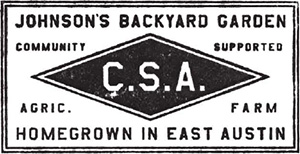
JBG'S YOLK FOLKS
04/30/21 — Ada Broussard
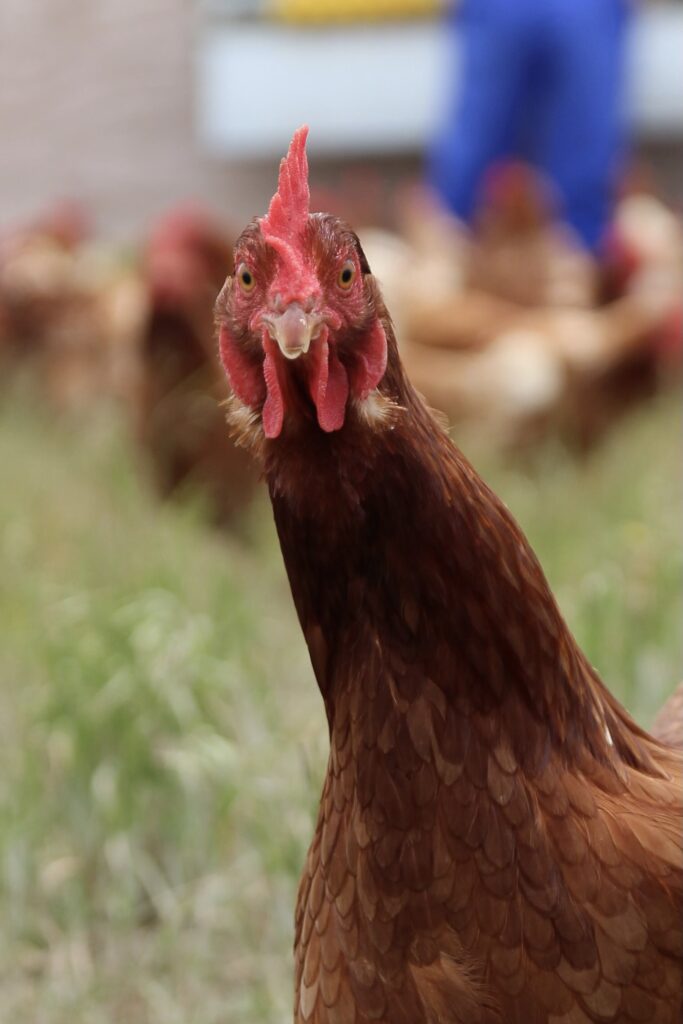 A curious, and most certainly happy, hen at Humble Rooster. Wonderful photo by Nathan at Humble Rooster.
A curious, and most certainly happy, hen at Humble Rooster. Wonderful photo by Nathan at Humble Rooster.
Since the early days of JBG when Brenton had his own backyard flock, we’ve loved offering (Austin) CSA Members the ability to add eggs onto their weekly share, because, with eggs + veggies, you can travel to a lot of places. (For those members outside of Austin, we're unable to offer eggs because our drivers don't have room in their vans! In case you're wondering why :) The eggs we offer aren’t just any eggs, and we’ve taken special care to partner up with local farmers who produce high-quality eggs laid by happy hens on pasture. Precious guardian dogs, while not a requirement of our egg standards, also just so happen to be a common thread.
The labels on egg cartons are almost endless and distinguishing a good egg from a bad egg can be confusing. Before we highlight the amazing producers JBG partners with, let us take a moment to tease apart some of the labels you might see at the grocery store.
 Just one example of said floofers. These are some of the guardian dogs at Happy Chicks.
Just one example of said floofers. These are some of the guardian dogs at Happy Chicks.
Pasture-Raised sometimes called “Pastured” (not to be confused with pasteurized): Pasture-raised or pastured eggs means that the chickens are raised on pasture, with access to open meadows or woody forests. These chickens hunt for food, peck around, and have space to express their truest chickenliness. They can dust-bathe, perch, and spread their wings - all-natural behaviors of these little dinosaurs. Pasture-raised chickens have access to a coop/nesting safe from predators, where they dutifully march at night to catch some Zzz or lay an egg. As in the case with all of the farms we work with, these coops can be mobile! We call these chicken tractors. The coops (and their inhabitants) are moved throughout an area so that the chickens can have access to fresh grass, and so that their impact (the nutrient-dense poop… the scratching…) can be dispersed throughout a landscape. Chickens raised in this manner benefit from a diverse diet and open air. Eggs laid by these gals feature a deep yellow (sometimes orange!) yolk, with clear and bouncy whites. All of the eggs we offer fit this bucolic bill.
It’s noteworthy that “pasture-raised” or “pastured” doesn’t have a legal certification process behind it. Some eggs you see in a store labeled with “pasture-raised” may be produced by chickens who merely have access to a small, outdoor run. While these chickens may have a better life than those raised in a factory farm, they’re still not running on an actual pasture.
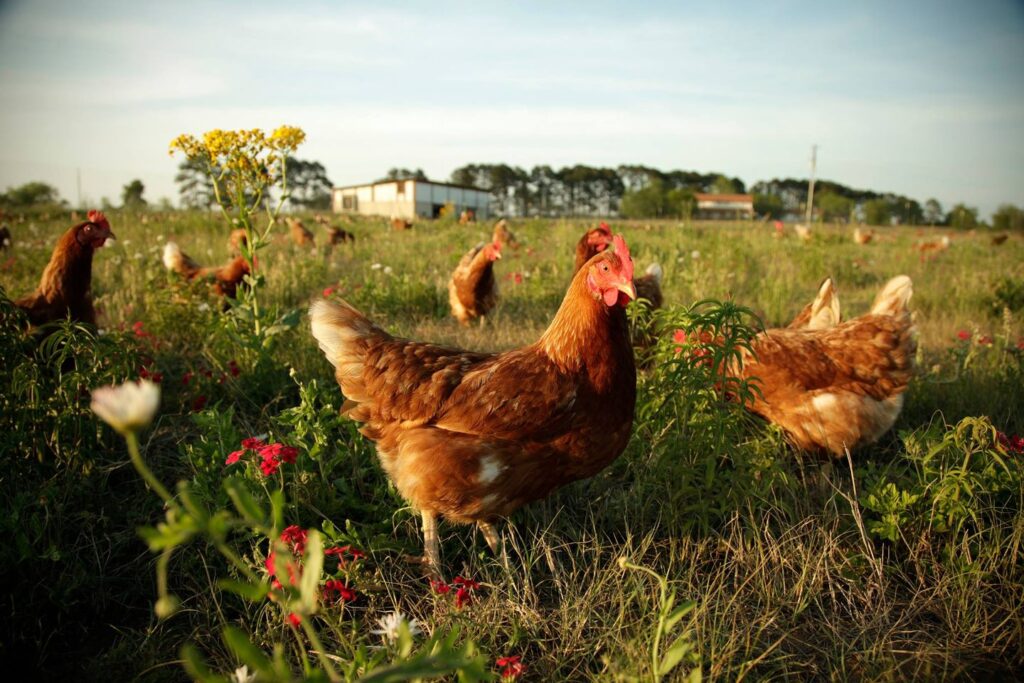 In the springtime, pasture-raised chickens get to romp and scratch in pastures of verbena and goldenrod. These are the lucky gals at Happy Chicks.
In the springtime, pasture-raised chickens get to romp and scratch in pastures of verbena and goldenrod. These are the lucky gals at Happy Chicks.
Organic: Even chickens raised in a thriving pastured ecosystem need supplemental food. If eggs are labeled “organic” it means that the chickens are eating feed that is certified organic and that they are not receiving any hormones or antibiotics. Not all pastured chickens are organic. All certified organic chickens must have access to the outdoors, though the quality of this access varies.
Free-Range: According to the USDA, free-range chickens must have “continuous access to an outdoor area during their laying cycle". The quality and size of this outdoor space can vary drastically, and it could simply mean a very small fenced-in area meant to suit thousand of birds.
Cage-free: This USDA designation simply means that chickens are not confined to individual cages (which are usually 8.5 x 11 inches, or the size of a sheet of computer paper. This certification does not stipulate, however, that the chickens must be allowed outdoors.
Most producers want you to know if they’re taking good care of their animals, and so an egg carton with no label likely means that chickens were raised in pretty horrendous, very-caged, conditions. The vast majority of eggs produced in the United States fall under this unfortunate umbrella. We’ll spare you the photos, but if you’re curious, google is littered with some visuals.
There are even more labels that get slapped on cartons like natural, farm-fresh, “Certified Humane”, “Animal Welfare Approved”, “Vegetarian-Fed” and also graded vs. ungraded. We don’t want to take up space here to discuss any more labels, however. As in the case with most foods, if you’re interested in consuming products that you can guarantee are good for you, and good for the environment, it’s simplest just to know your producer… and even pay a visit to their farm. And even though you might not personally know the farmers at Ringger Family, Humble Rooster, and Happy Chicks farms, we do! You can take a sigh of relief- they are all incredible farmers, raising chickens in the most dignified way. Yes, they are all raising their flocks on pasture, but the stewardship of their animals goes beyond this simplistic label. These chickens have great lives! (And produce superb eggs!) We’ve been partnering with some of these farms for nearly 10 years, and we see these friendly faces each week when they make deliveries to the Packing Shed. We hope you’ll take our word for it that these farmers are worth supporting, not only because they produce a high-quality product produced by sustainable means, but also because they’re good people, with good families, doing eggcellent work. Sorry, we couldn’t help ourselves.
RINGGER FAMILY FARMS Ringger Family Farms is owned by Eli Ringger. Eli is the son of Dale and Amy Ringger, owners of Fruitful Hill Farm, an amazing 50-acre chemical-free vegetable farm located in Bastrop County. The Ringgers have been raising happy chickens for as long as we’ve known them (we’ve been buying their eggs since 2012!), and a few years ago, their oldest son Eli took over the egg portion of the business, now called Ringger Family Farms.
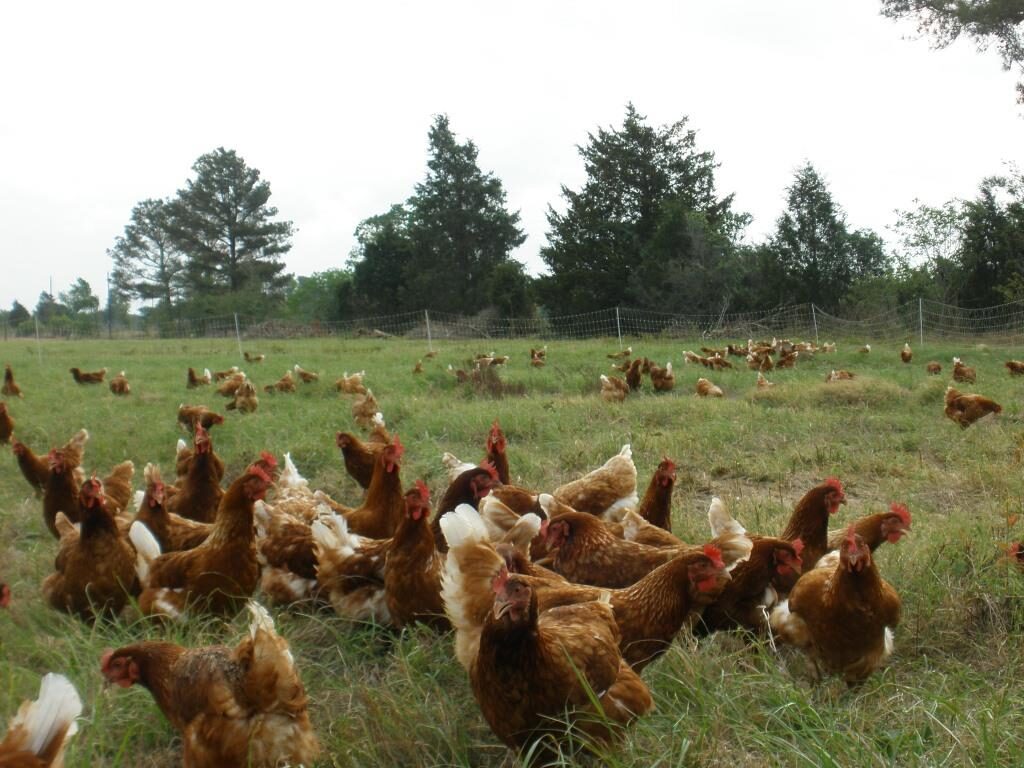 Here are the healthy hens at Ringer Family farms. In the background, you can see the chicken fencing which gets moved through the pasture along with the flock, and mobile coops. Thanks Fruitful Hill for the photo!
Here are the healthy hens at Ringer Family farms. In the background, you can see the chicken fencing which gets moved through the pasture along with the flock, and mobile coops. Thanks Fruitful Hill for the photo!
At the Ringger’s farm, their “Hy-Line Brown” (the breed of chicken they raise) are rotated on chemical-free pasture and are fed a non-GMO, soy-free feed that the Ringgers grind themselves. These hens are living the good life, and even get veggie scraps from time to time.
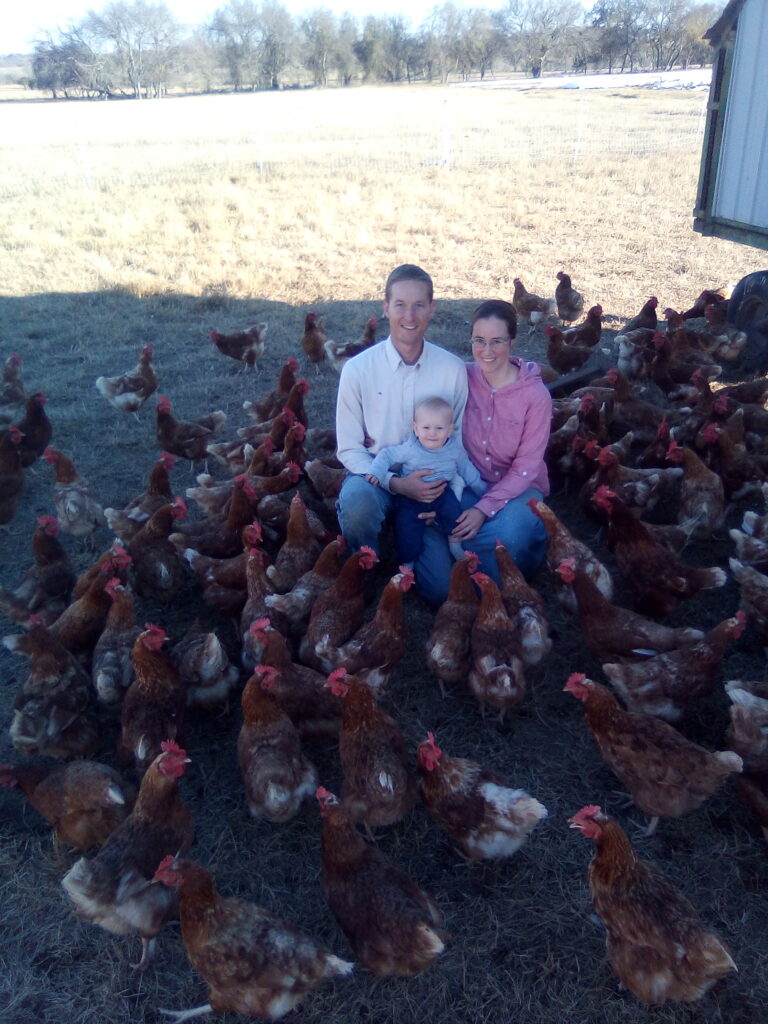 Eli, his wife Sheila, and their son John... and of course, all the ladies!
Eli, his wife Sheila, and their son John... and of course, all the ladies!
If you’d like to see these hens for yourself, the Ringgers have a farmstand every Friday afternoon from 2-5:30 PM. The address is 2421 SH 304, Smithville TX 78957. Look for the red barn and tents. If you want to see the chickens, just let them know.. they’re never far! In addition to pastured eggs, Ringger Family Farm also sells pastured beef, pastured goat meat, and pork from pigs living in the woods, fed veggie scraps, and non-GMO, soy-free feed.
HUMBLE ROOSTER FARM Humble Rooster Farm is owned by the Hicks family and is located 40 minutes northwest of Austin in Bertram, Texas. They raise poultry outside on pasture in the sunshine, using sustainable farming methods. Their birds are pasture-raised, soy-free, corn-free, hormone-free, antibiotic-free, chemical-free, non-GMO, and are supplemented with H and H Feed, a freshly milled Texas feed.
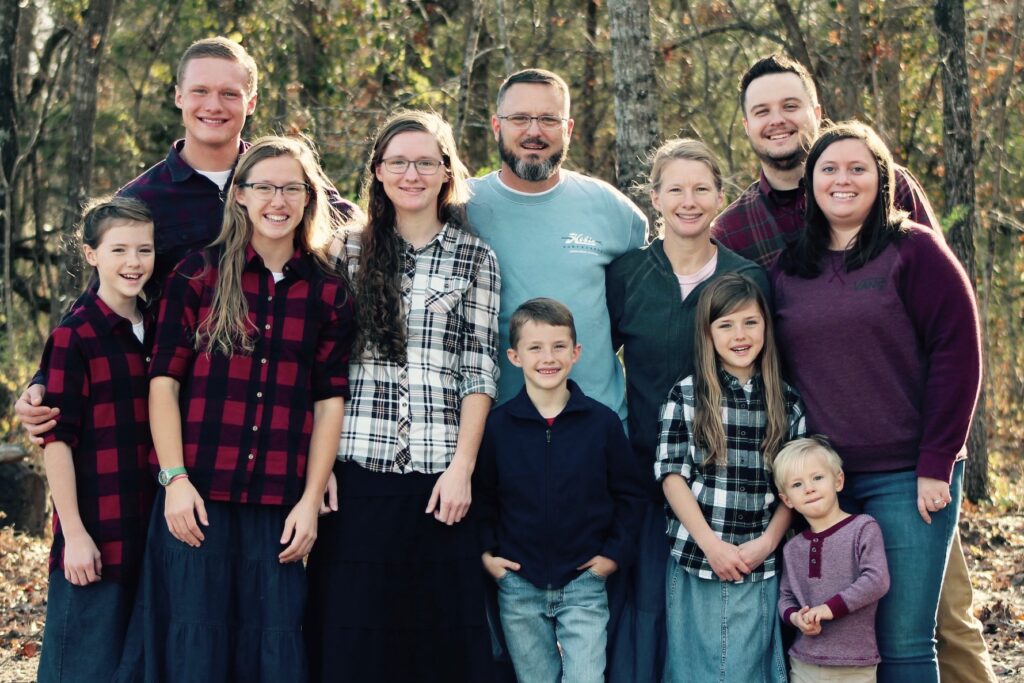 The Hicks!
The Hicks!
We’ve been working with Humble rooster since 2018, and have been impressed with the egg quality since day one. Like the other two vendors we work with, Humble Rooster’s eggs are truly pasture-raised. Taken from their website: “What "pastured" means for us is a rotational grazing process. Our chickens don't simply have ability to pasture. Our chickens live on the pasture. We routinely rotate our poultry on pasture. Each week, our hens' mobile coops are moved to new areas…. This process is one aspect of how we are able to be antibiotic- and chemical-free, because our birds are constantly moving to "cleaner" ground, helping maintain health naturally.” If you’d like to visit Humble Rooster, they do have an option for a farm pickup on Tuesdays and Thursdays from 3 pm and 5 pm. More info on their website.
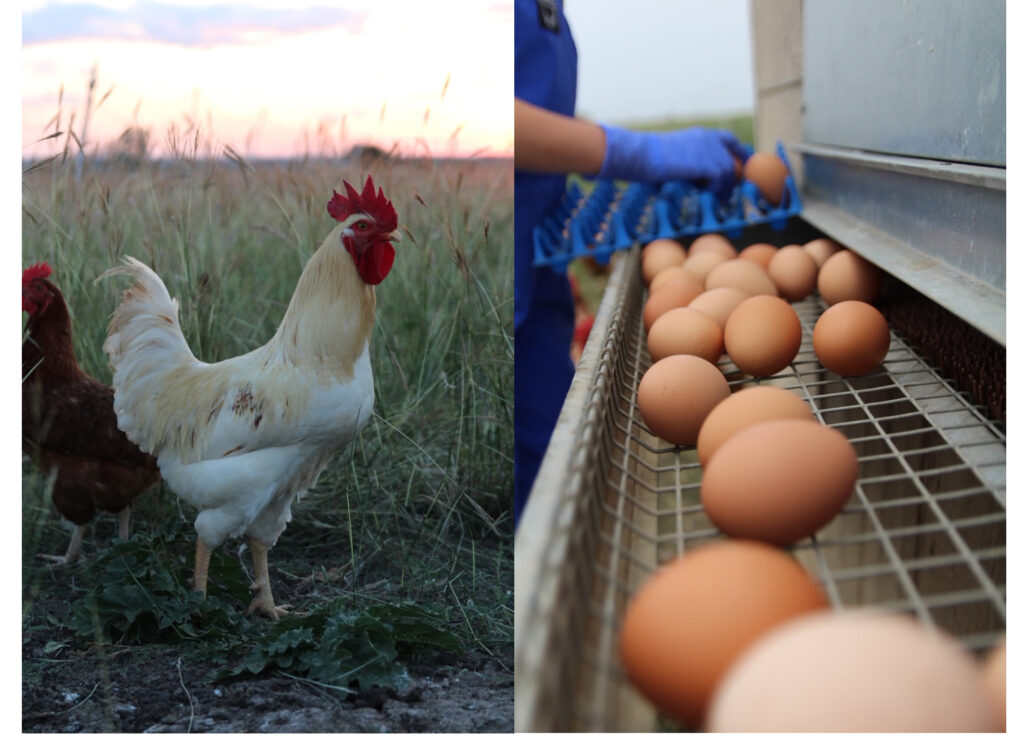 Many chicken producers will have a rooster or two along with their flock of hens. His job is to help protect the ladies. In the photo on the right, you can see egg collection happening at Humble Rooster. Nesting boxes are located on the inside of the coop, but this collection tray is conveniently located on the outside. Photos provided by Nathan at Humble Rooster.
Many chicken producers will have a rooster or two along with their flock of hens. His job is to help protect the ladies. In the photo on the right, you can see egg collection happening at Humble Rooster. Nesting boxes are located on the inside of the coop, but this collection tray is conveniently located on the outside. Photos provided by Nathan at Humble Rooster.
HAPPY CHICK FARM
As the name suggests, the hens at Happy Chick are… happy. This farm, located in Lockhart, is owned and operated by Kenny and Stephanie Johnson. Like the other two producers we work with, the hens at Happy Chick are raised on beautiful pasture.
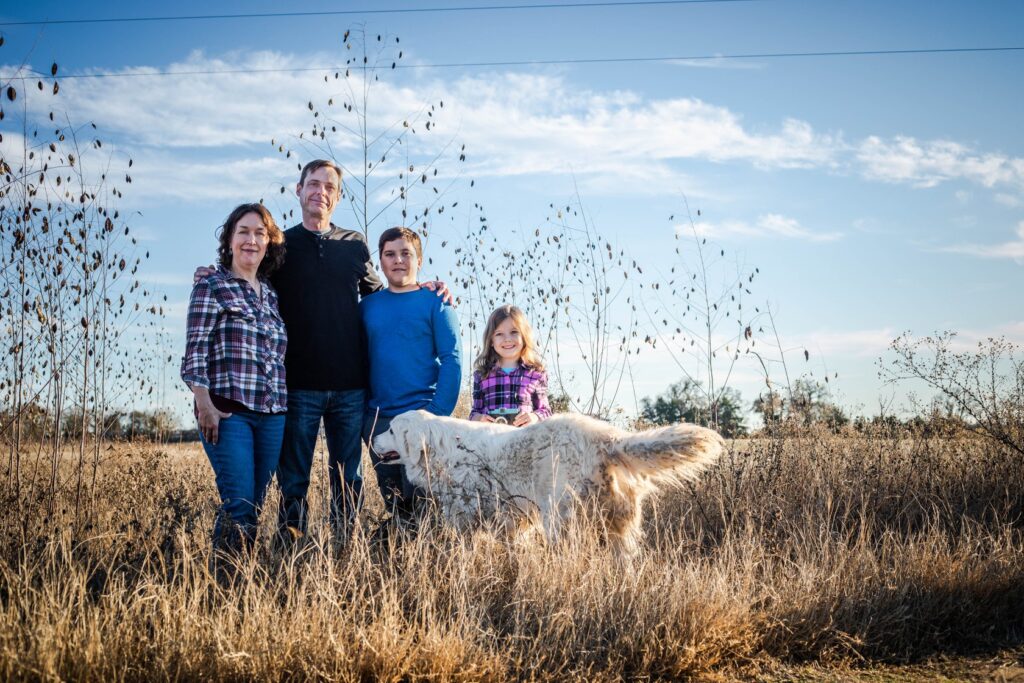 The Johnson Family behind Happy Chick!
The Johnson Family behind Happy Chick!
In a recent article Kenny wrote for his local newspaper, he shared some wise words on egg producers like him (and vegetable producers, like us): “I realize locally produced, farm-fresh foods are typically more expensive, but buying cheaply produced food in the short term has costs in the long term. Most of us know this, but still value the dollar over sustainability. Who wouldn’t want to save a buck? Factory-style industrial farms feed over 80% of the population, creating economies of scale untouchable by the small-scale family farmer. It’s not that sourcing local is expensive. It’s that factory-style foods are cheap, of poor quality, mass-produced, and are distributed across the entire country by only a handful of distribution companies whose supply lines crumble at the sight of a winter storm.”
Check out Happy Chick Facebook Page to see more cute guardian dog pictures, and to inquire about farm visits.
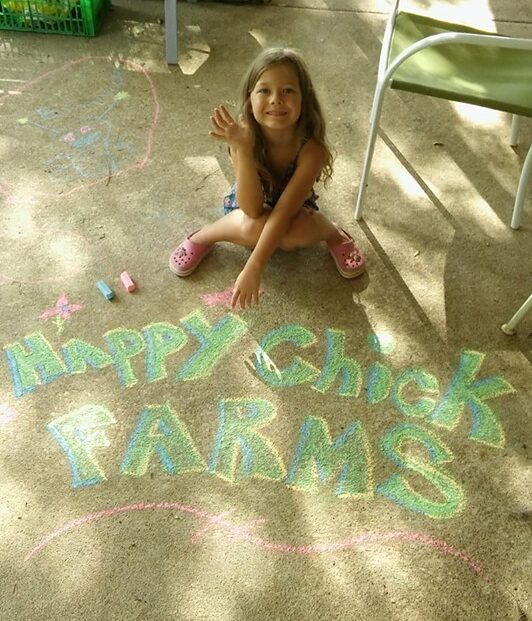 Emma, the youngest farmer at Happy Chicks.
Emma, the youngest farmer at Happy Chicks.
If you’re a CSA Member and would like to give some of these locally-produced eggs a try, log in to your account. You can add one dozen (or many) through the “My Deliveries” tab. Having trouble? Just shoot A an email and she can help you out - farm@jbgorganic.com.
Thanks for reading. We hope you have an eggstraordinary day!
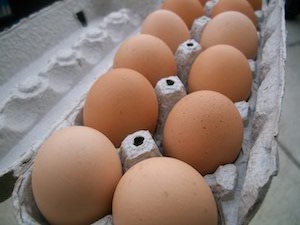 The incredible, edible, egg. Photo and eggs by Humble Rooster.
The incredible, edible, egg. Photo and eggs by Humble Rooster.CSA BOX CONTENTS WEEK OF APRIL 26TH
04/27/21 — Scott
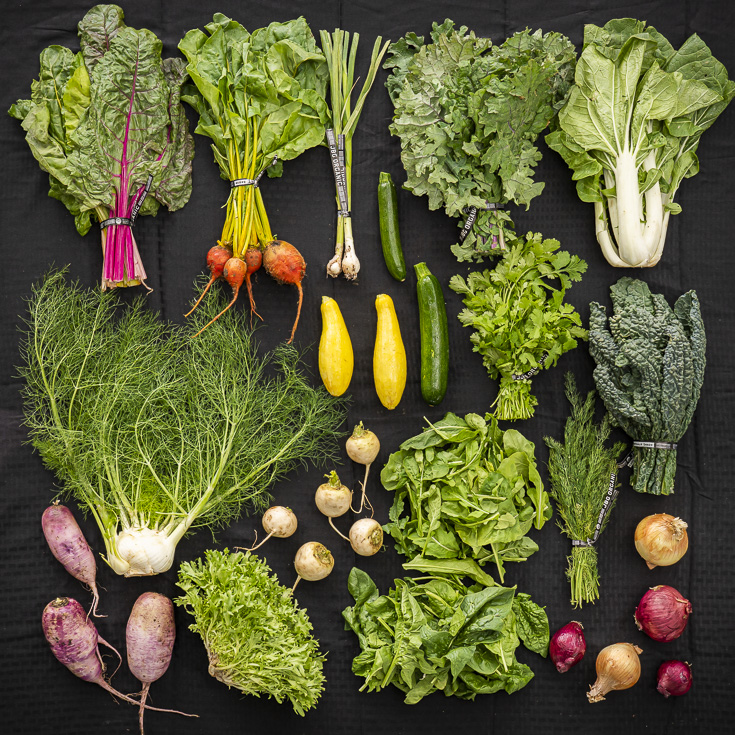 CSA Box Contents Week of April 26th
CSA Box Contents Week of April 26th
Individual: Carrots, Greens Farmers Choice, Spinach, Herb, Romaine Lettuce, Onions
Small: Carrots, Rainbow Chard, Greens Farmers Choice, Herb, Romaine Lettuce, Onions, Red Radish
Medium: Beets, Carrots, Kale, Mustard Greens, Spinach, Herb, Romaine Lettuce, Onions, Red Radish, Turnip
Large: Beets, Carrots, Greens Farmers Choice, Kale, Mustard Greens, Spinach, Herb, Fennel, Romaine Lettuce, Onions, Red Radish
PHOTOS FROM THE FARM: 4.23.21
04/23/21 — Ada Broussard
Scott captured some early morning shots of the farm this week, and everything is looking particularly vibrant. The lettuce, fennel, and beet greens all seem to be celebrating earth month, and even the tomatoes are staying busy growing tall. It's nearing the end of our Spring Transplant sale, and if you haven't yet planted a garden for the summer, it's not too late! We still have hundreds of tomatoes, peppers, herbs, and flowers available for sale.
![]() Green and red leaf lettuce, perfectly complementary. Photo by Scott David Gordon.
Green and red leaf lettuce, perfectly complementary. Photo by Scott David Gordon.
![]() Salad for days. Photo by Scott David Gordon.
Salad for days. Photo by Scott David Gordon.
![]() So much beautiful food growing at the farm. Have you seen it with your own eyes? If not, we encourage you to visit the Saturday Farmstand! Photo by Scott David Gordon.
So much beautiful food growing at the farm. Have you seen it with your own eyes? If not, we encourage you to visit the Saturday Farmstand! Photo by Scott David Gordon.
![]() Lime green food, yes please. Photo by Scott David Gordon.
Lime green food, yes please. Photo by Scott David Gordon.
![]() When a delivery van becomes a harvest van, and the paint fades away. Photo by Scott David Gordon.
When a delivery van becomes a harvest van, and the paint fades away. Photo by Scott David Gordon.
![]() Unloading clean and sanitized ifcos. Photo by Scott David Gordon.
Unloading clean and sanitized ifcos. Photo by Scott David Gordon.
![]() We have rows of perianal herbs at the farm, including this vibrant patch of mint. Photo by Scott David Gordon.
We have rows of perianal herbs at the farm, including this vibrant patch of mint. Photo by Scott David Gordon.
![]() Furry fennel. Photo by Scott David Gordon.
Furry fennel. Photo by Scott David Gordon.
![]() Arugula, left to flower for the bees. Did you know arugula flowers are delightfully nutty, and make a perfect salad topping? We aren't able to harvest them for sale, but if you visit the farm you're welcome to pick some for yourself! Photo by Scott David Gordon.
Arugula, left to flower for the bees. Did you know arugula flowers are delightfully nutty, and make a perfect salad topping? We aren't able to harvest them for sale, but if you visit the farm you're welcome to pick some for yourself! Photo by Scott David Gordon.
![]() It must be spring! A very full harvest van. Photo by Scott David Gordon.
It must be spring! A very full harvest van. Photo by Scott David Gordon.
![]() Irrigation repairs, and a rare look at what our irrigation system looks like underground. Photo by Scott David Gordon.
Irrigation repairs, and a rare look at what our irrigation system looks like underground. Photo by Scott David Gordon.
![]() Can you identify this crop? Hit: It goes beautifully with tomatoes! Photo by Scott David Gordon.
Can you identify this crop? Hit: It goes beautifully with tomatoes! Photo by Scott David Gordon.
![]() The tomatoes are sizing up, and the first line of our Florida weave is installed! Soon, these rows will be towering tunnels of tomatoes, but for now they are all very manageable. Photo by Scott David Gordon.
The tomatoes are sizing up, and the first line of our Florida weave is installed! Soon, these rows will be towering tunnels of tomatoes, but for now they are all very manageable. Photo by Scott David Gordon.
![]() The first tomatoes are showing themselves! How time flies! Photo by Scott David Gordon.
The first tomatoes are showing themselves! How time flies! Photo by Scott David Gordon.
![]() Beet greens looking good! Photo by Scott David Gordon.
Beet greens looking good! Photo by Scott David Gordon.
![]() Giana, keeper of the greenhouse. Photo by Scott David Gordon.
Giana, keeper of the greenhouse. Photo by Scott David Gordon.
![]() Sweet potato slips. Photo by Scott David Gordon.
Sweet potato slips. Photo by Scott David Gordon.
![]() Please, if you will, checkout the size of this chard! Photo by Scott David Gordon.
Please, if you will, checkout the size of this chard! Photo by Scott David Gordon.
![]() Debating on the best way to use romaine. Photo by Scott David Gordon.
Debating on the best way to use romaine. Photo by Scott David Gordon.
![]()
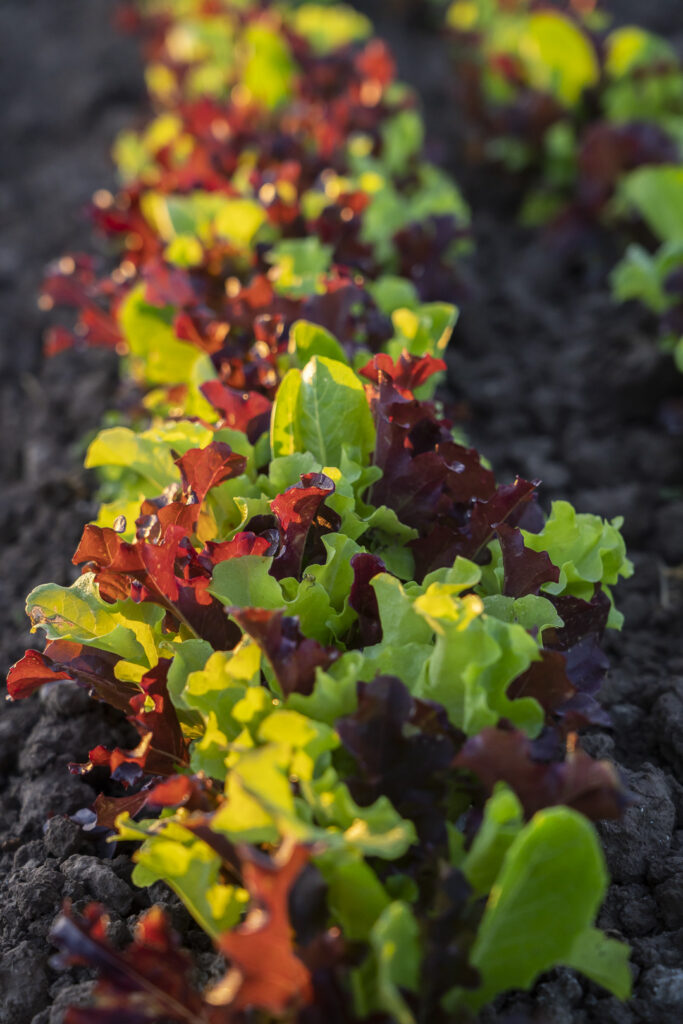 Green and red leaf lettuce, perfectly complementary. Photo by Scott David Gordon.
Green and red leaf lettuce, perfectly complementary. Photo by Scott David Gordon.
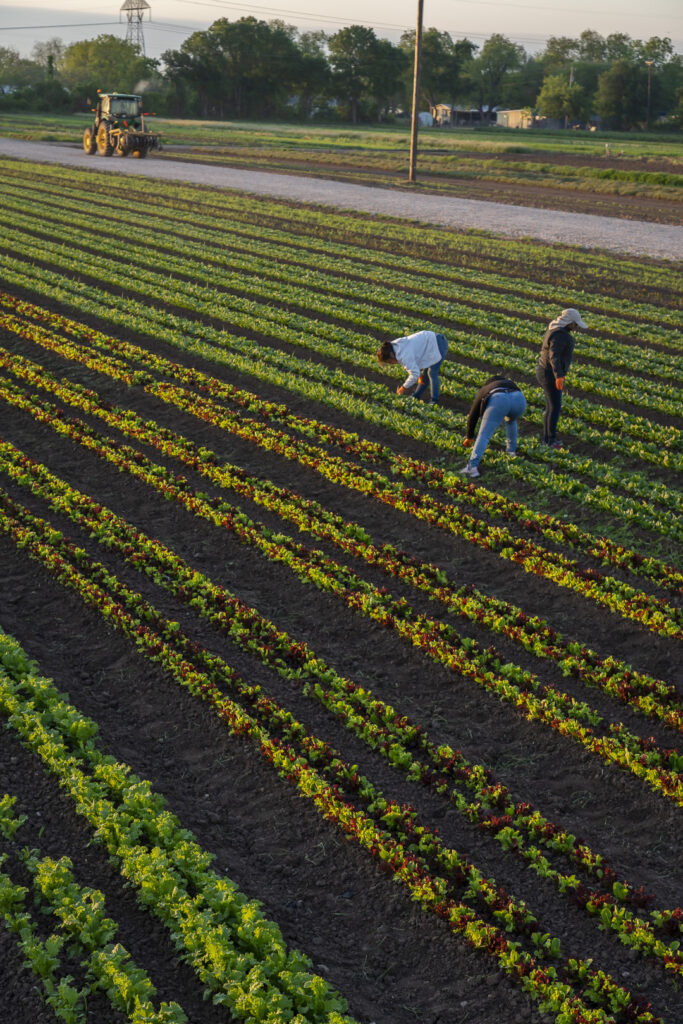 Salad for days. Photo by Scott David Gordon.
Salad for days. Photo by Scott David Gordon.
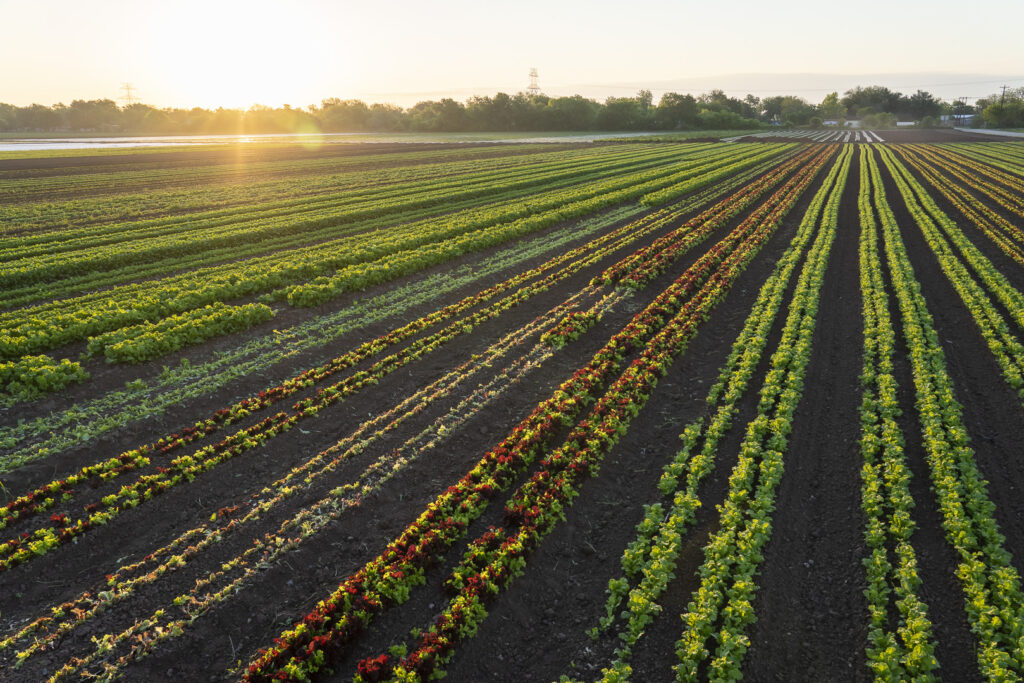 So much beautiful food growing at the farm. Have you seen it with your own eyes? If not, we encourage you to visit the Saturday Farmstand! Photo by Scott David Gordon.
So much beautiful food growing at the farm. Have you seen it with your own eyes? If not, we encourage you to visit the Saturday Farmstand! Photo by Scott David Gordon.
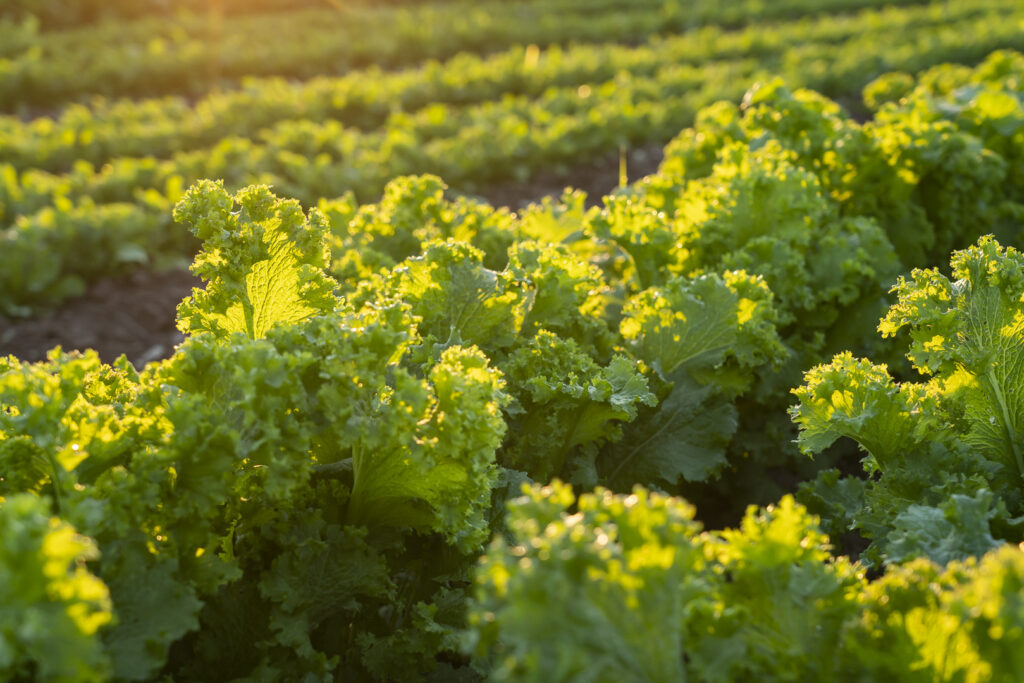 Lime green food, yes please. Photo by Scott David Gordon.
Lime green food, yes please. Photo by Scott David Gordon.
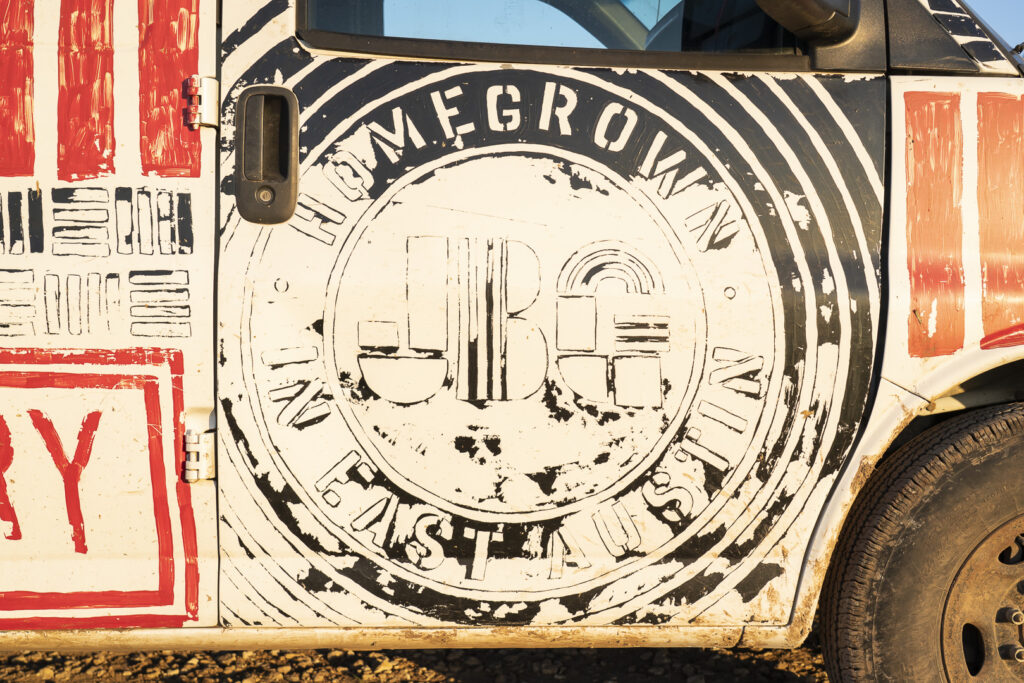 When a delivery van becomes a harvest van, and the paint fades away. Photo by Scott David Gordon.
When a delivery van becomes a harvest van, and the paint fades away. Photo by Scott David Gordon.
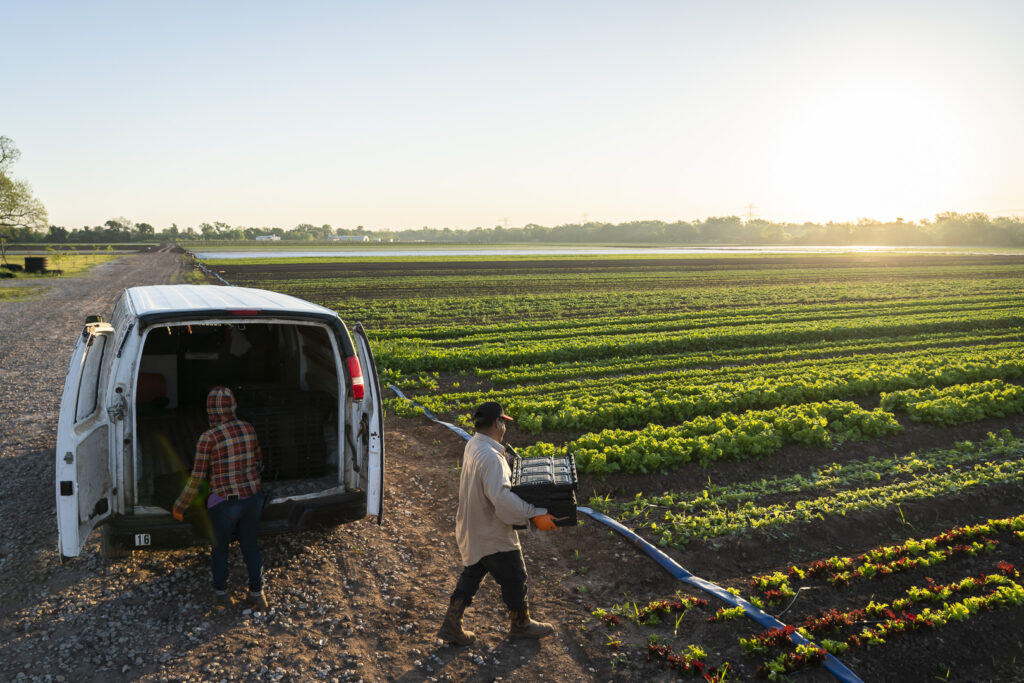 Unloading clean and sanitized ifcos. Photo by Scott David Gordon.
Unloading clean and sanitized ifcos. Photo by Scott David Gordon.
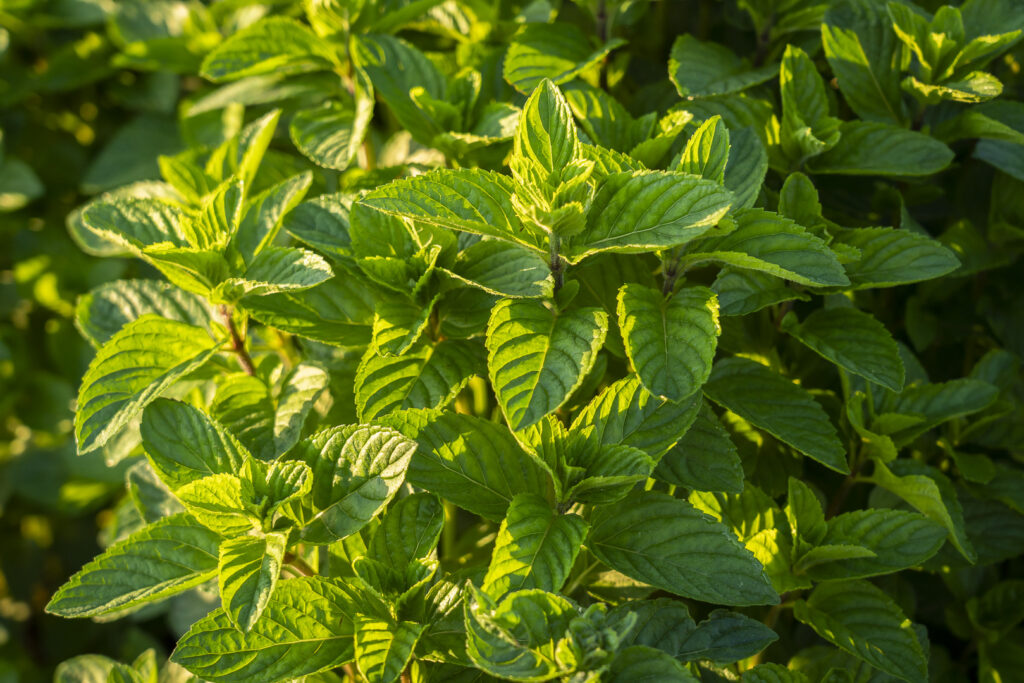 We have rows of perianal herbs at the farm, including this vibrant patch of mint. Photo by Scott David Gordon.
We have rows of perianal herbs at the farm, including this vibrant patch of mint. Photo by Scott David Gordon.
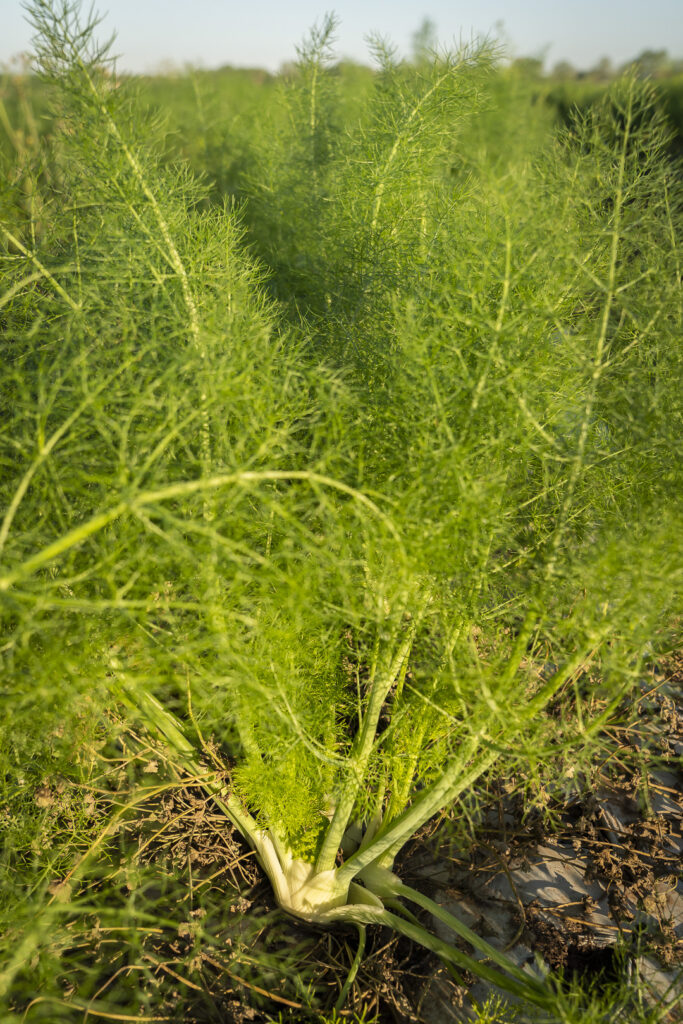 Furry fennel. Photo by Scott David Gordon.
Furry fennel. Photo by Scott David Gordon.
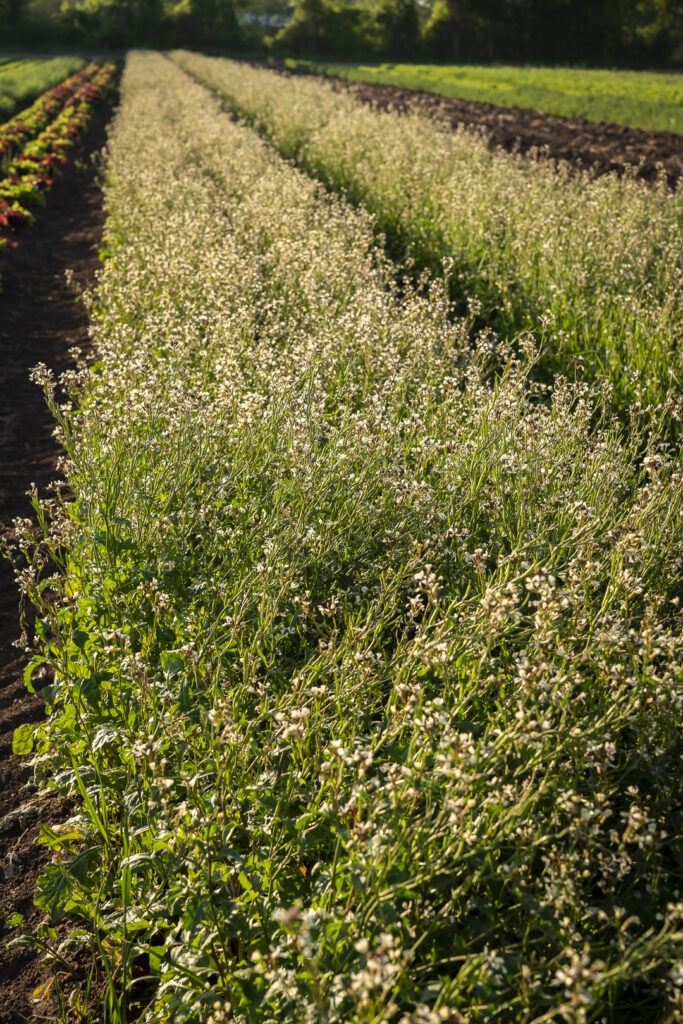 Arugula, left to flower for the bees. Did you know arugula flowers are delightfully nutty, and make a perfect salad topping? We aren't able to harvest them for sale, but if you visit the farm you're welcome to pick some for yourself! Photo by Scott David Gordon.
Arugula, left to flower for the bees. Did you know arugula flowers are delightfully nutty, and make a perfect salad topping? We aren't able to harvest them for sale, but if you visit the farm you're welcome to pick some for yourself! Photo by Scott David Gordon.
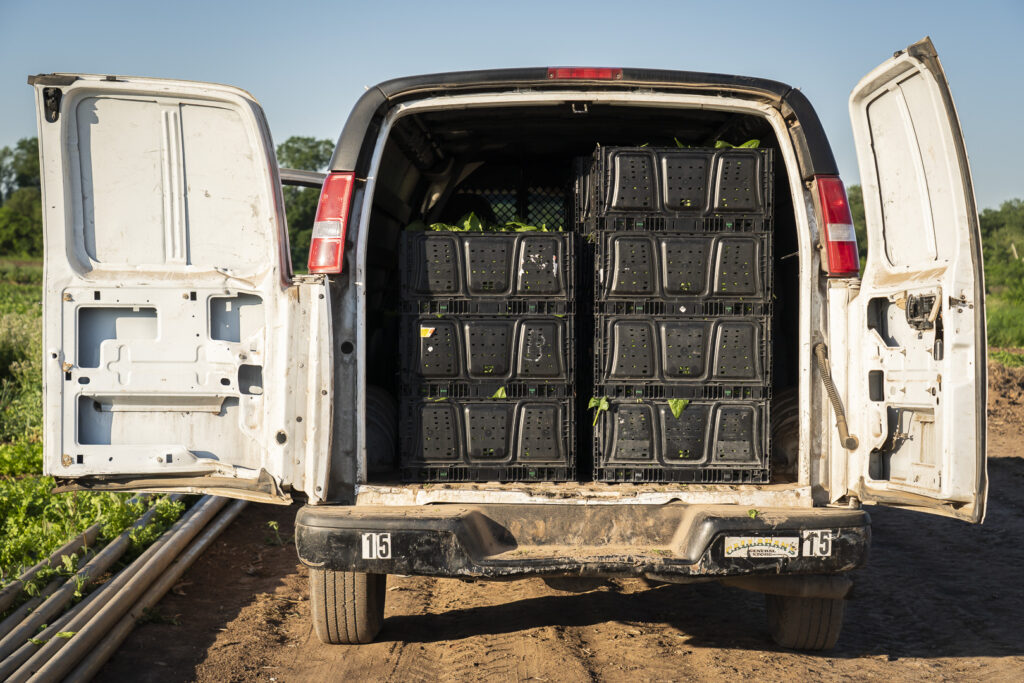 It must be spring! A very full harvest van. Photo by Scott David Gordon.
It must be spring! A very full harvest van. Photo by Scott David Gordon.
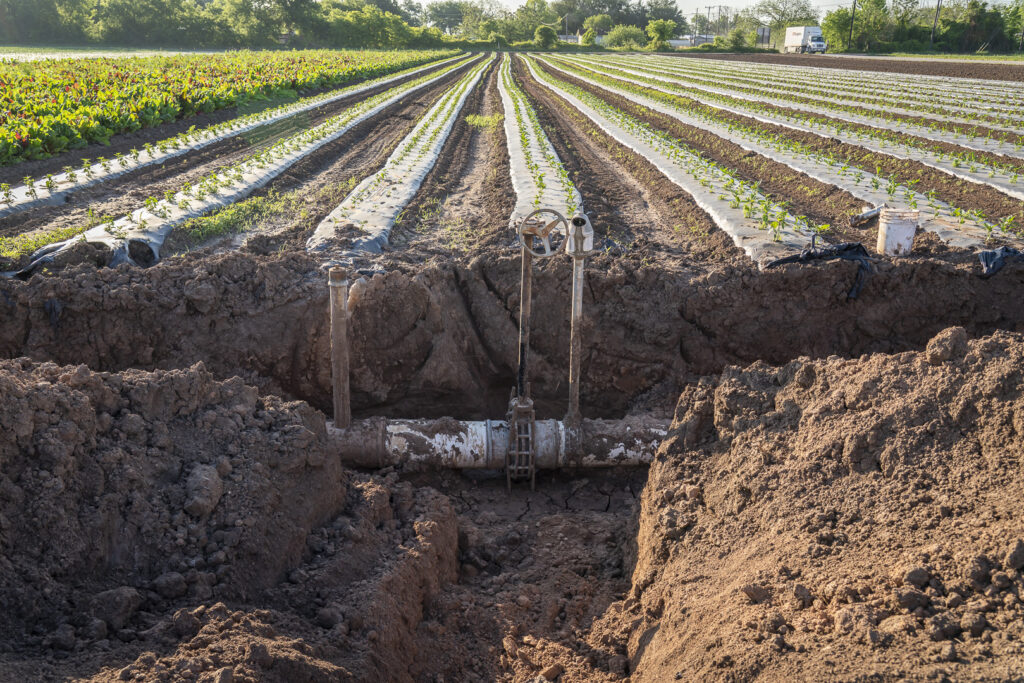 Irrigation repairs, and a rare look at what our irrigation system looks like underground. Photo by Scott David Gordon.
Irrigation repairs, and a rare look at what our irrigation system looks like underground. Photo by Scott David Gordon.
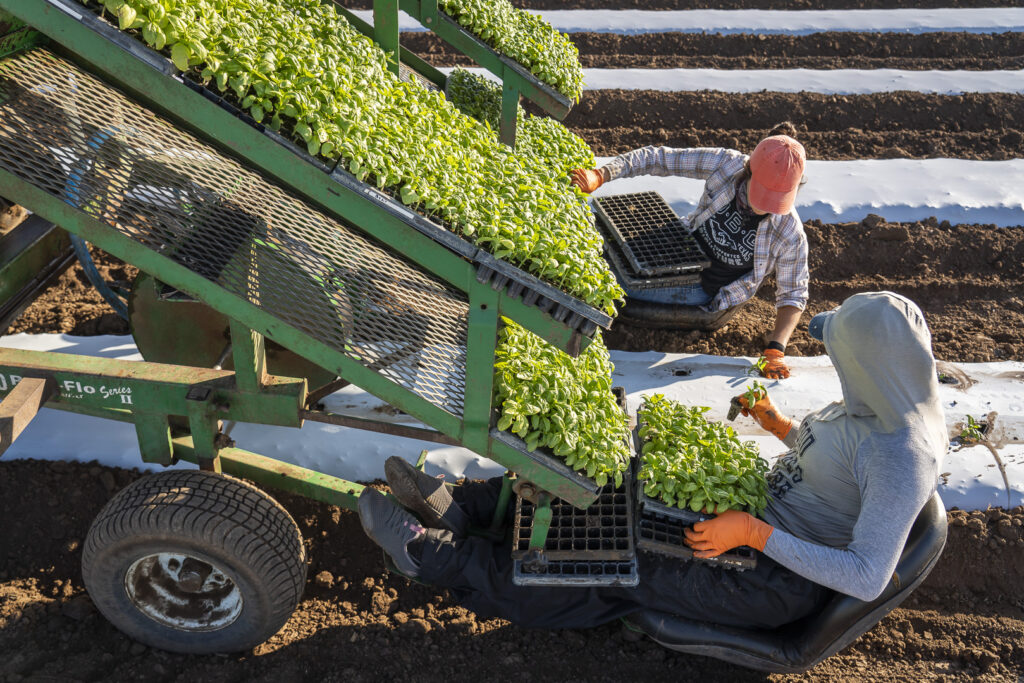 Can you identify this crop? Hit: It goes beautifully with tomatoes! Photo by Scott David Gordon.
Can you identify this crop? Hit: It goes beautifully with tomatoes! Photo by Scott David Gordon.
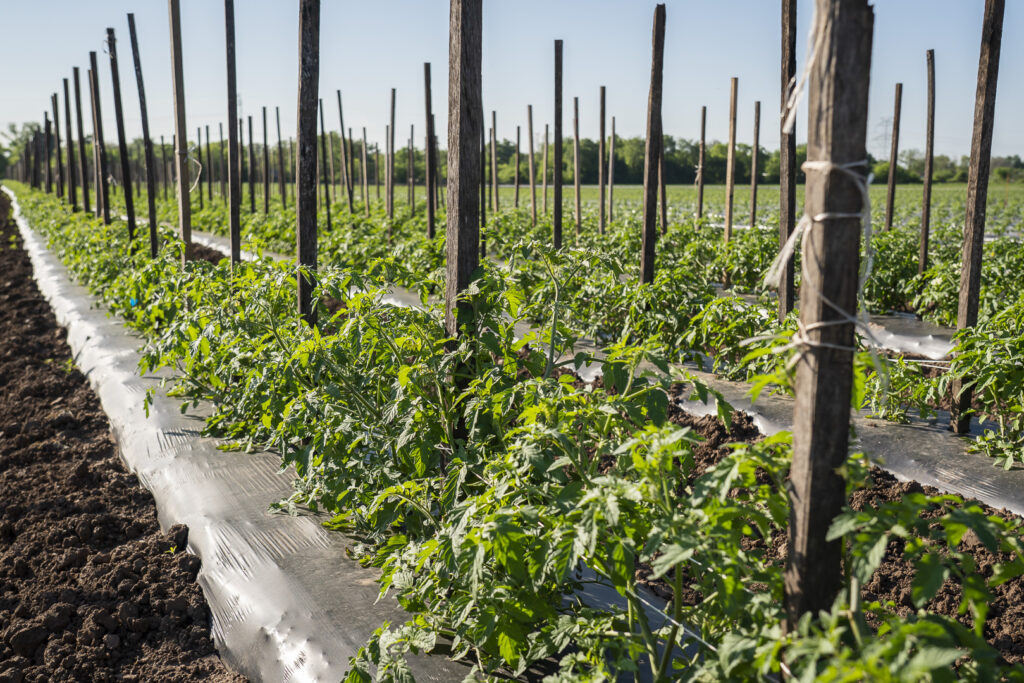 The tomatoes are sizing up, and the first line of our Florida weave is installed! Soon, these rows will be towering tunnels of tomatoes, but for now they are all very manageable. Photo by Scott David Gordon.
The tomatoes are sizing up, and the first line of our Florida weave is installed! Soon, these rows will be towering tunnels of tomatoes, but for now they are all very manageable. Photo by Scott David Gordon.
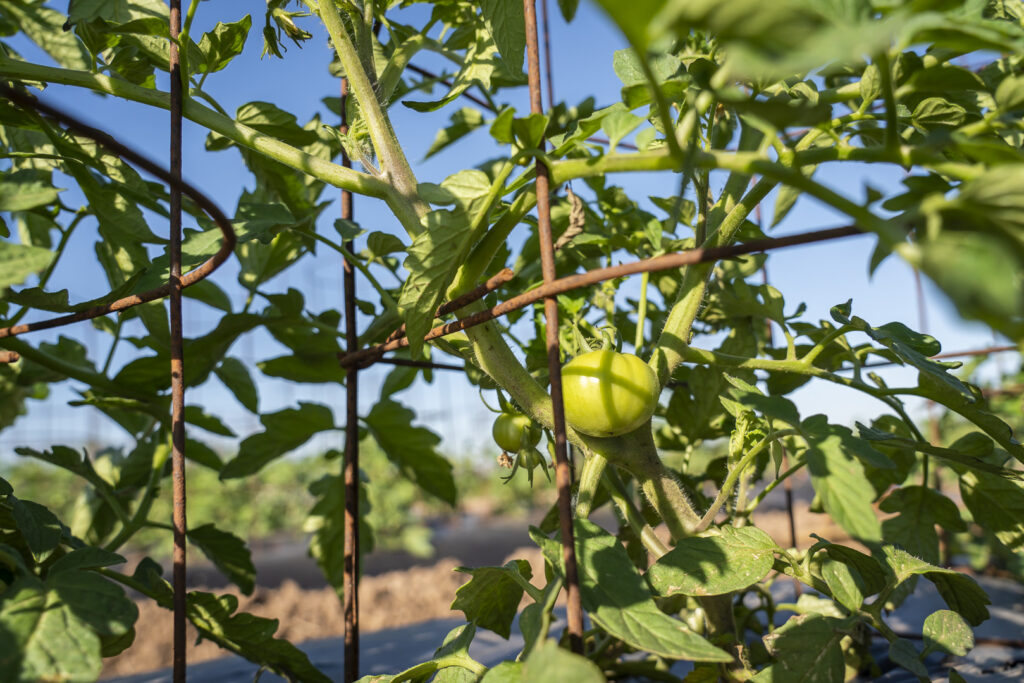 The first tomatoes are showing themselves! How time flies! Photo by Scott David Gordon.
The first tomatoes are showing themselves! How time flies! Photo by Scott David Gordon.
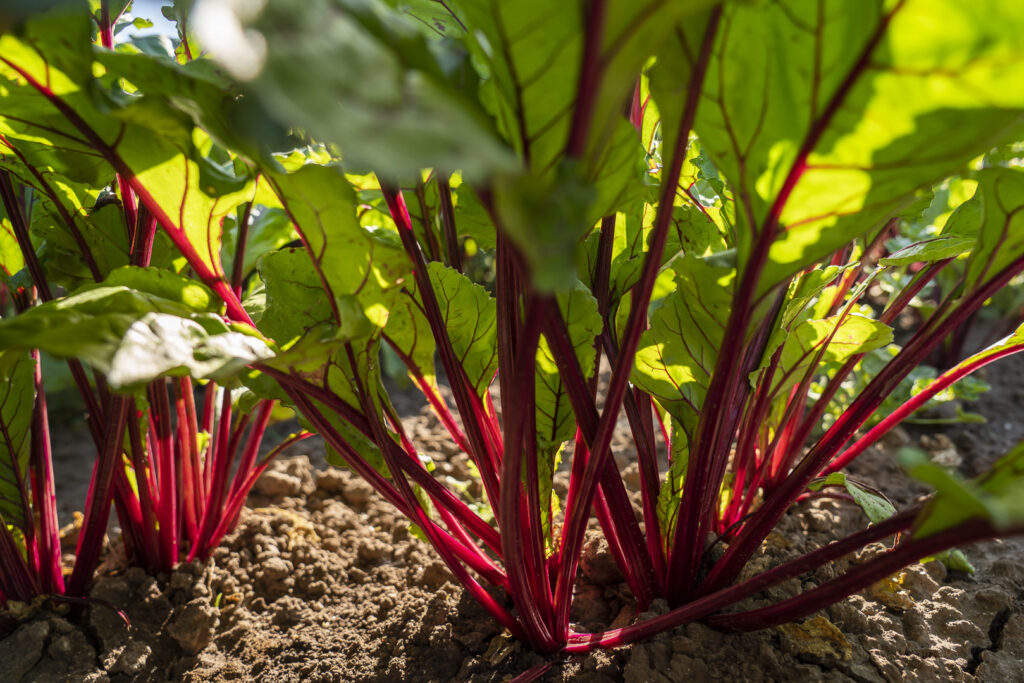 Beet greens looking good! Photo by Scott David Gordon.
Beet greens looking good! Photo by Scott David Gordon.
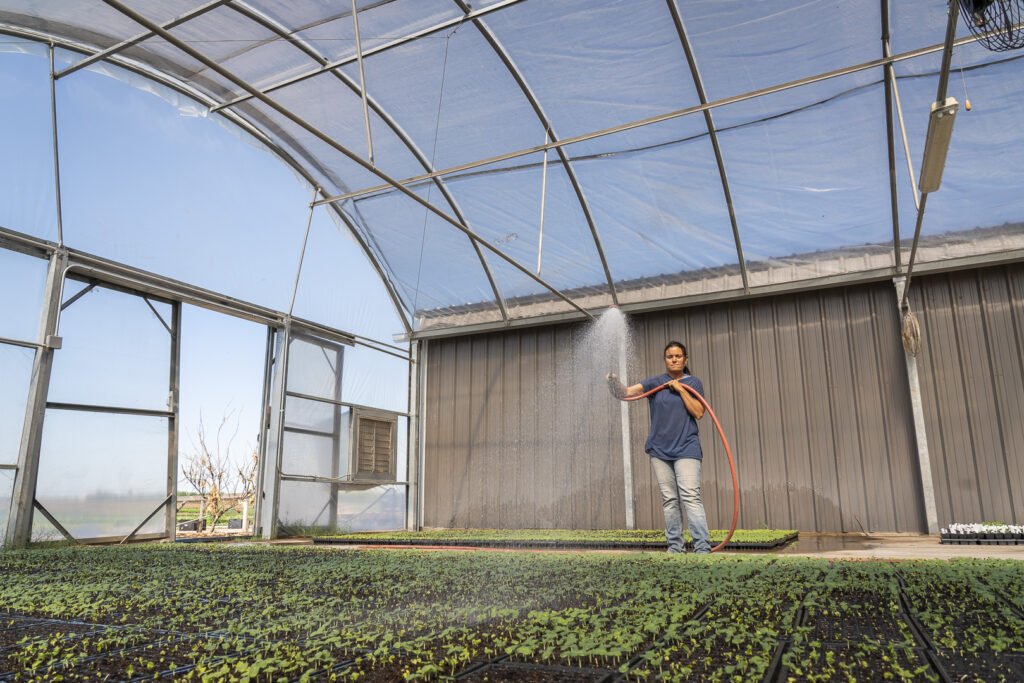 Giana, keeper of the greenhouse. Photo by Scott David Gordon.
Giana, keeper of the greenhouse. Photo by Scott David Gordon.
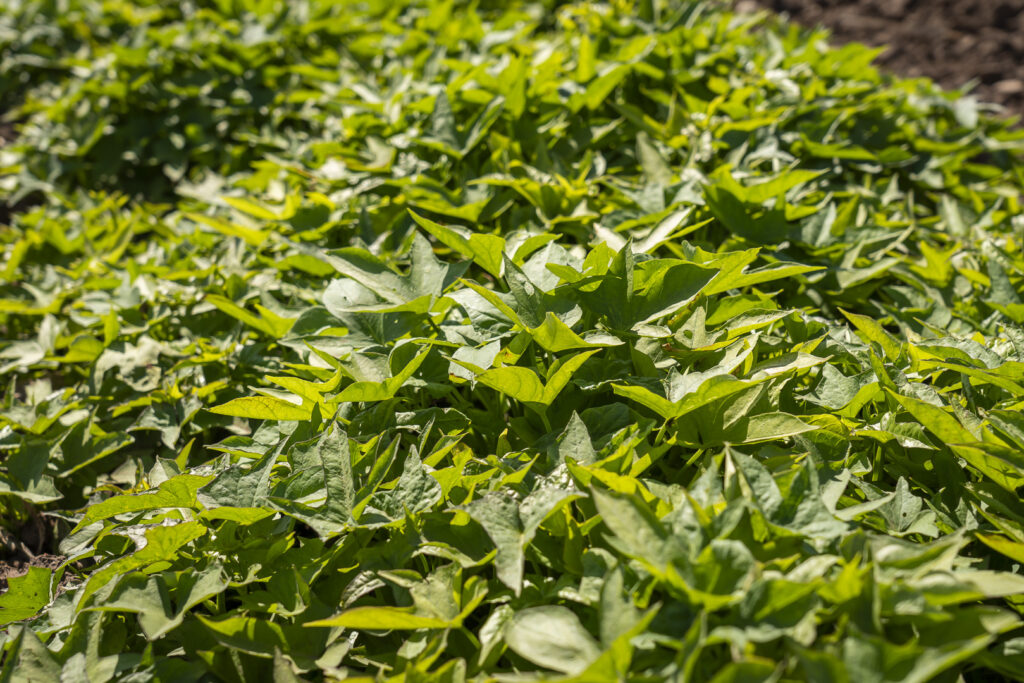 Sweet potato slips. Photo by Scott David Gordon.
Sweet potato slips. Photo by Scott David Gordon.
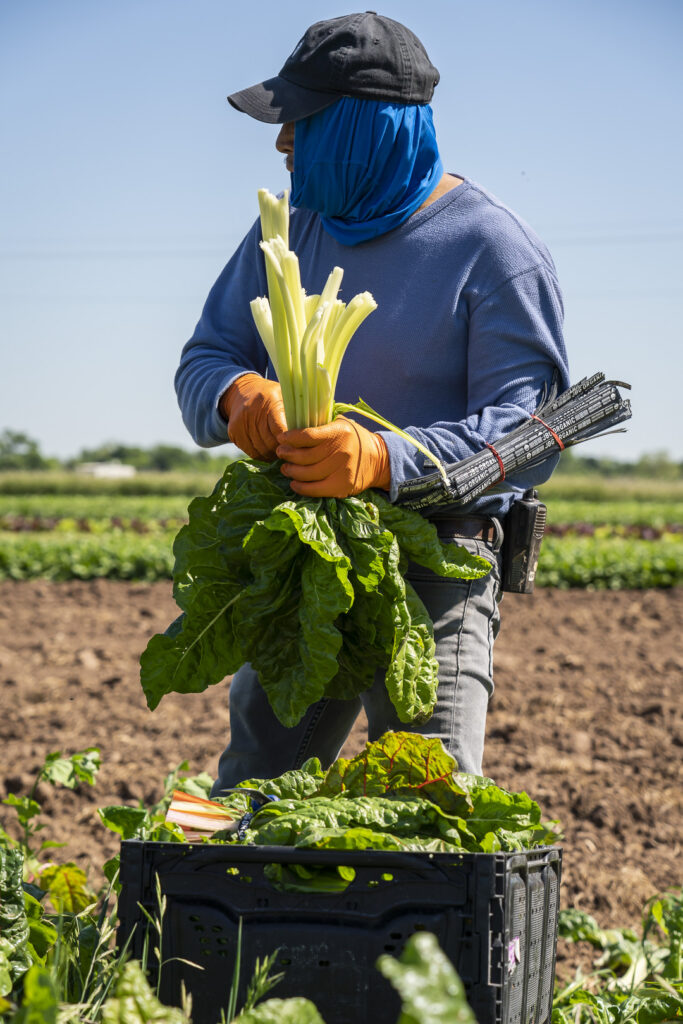 Please, if you will, checkout the size of this chard! Photo by Scott David Gordon.
Please, if you will, checkout the size of this chard! Photo by Scott David Gordon.
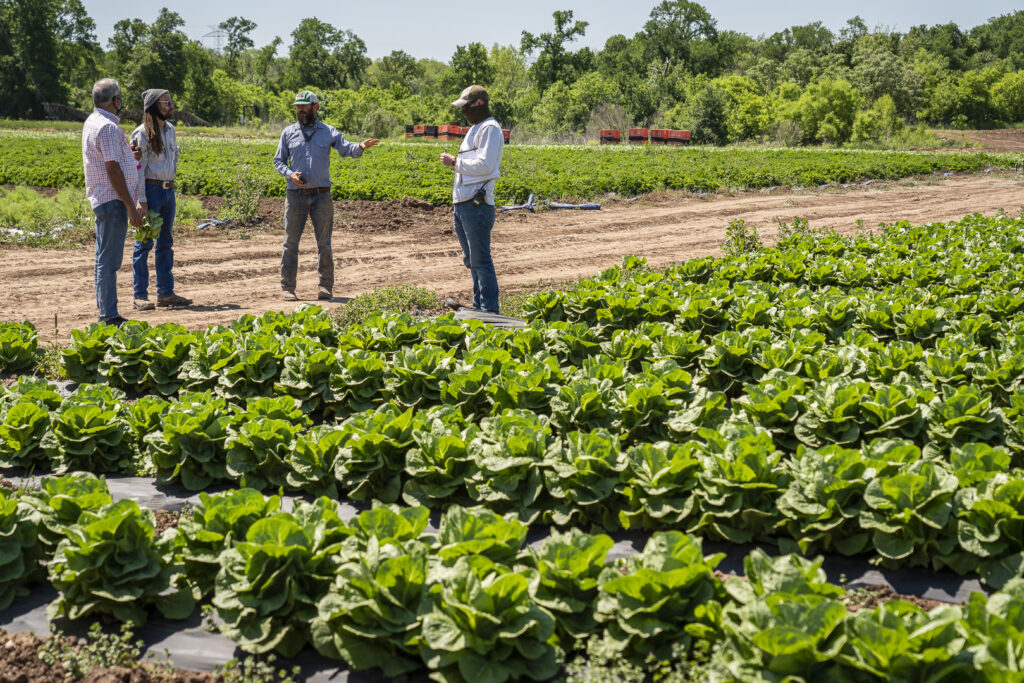 Debating on the best way to use romaine. Photo by Scott David Gordon.
Debating on the best way to use romaine. Photo by Scott David Gordon.
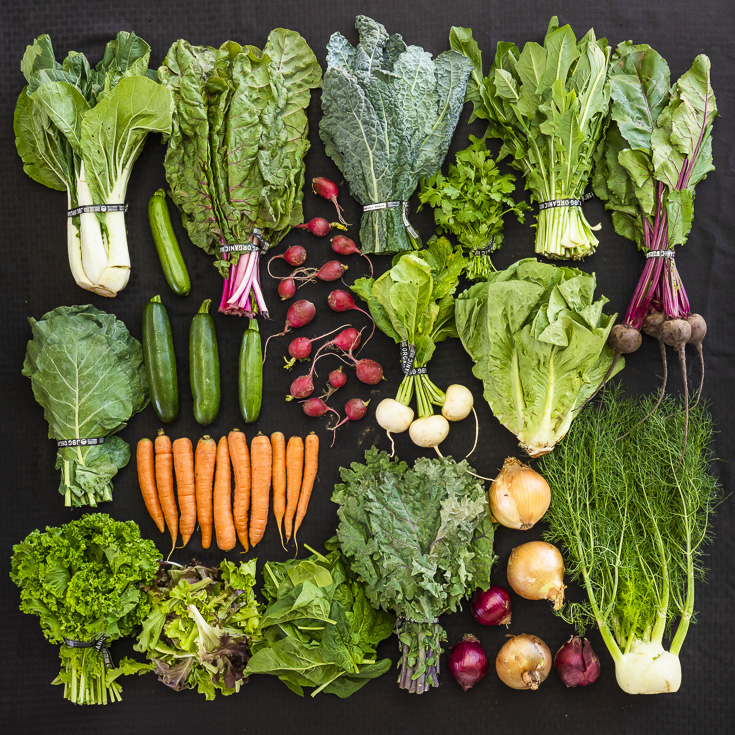
5 WAYS TO EARTH DAY THIS WEEKEND
04/23/21 — Ada Broussard
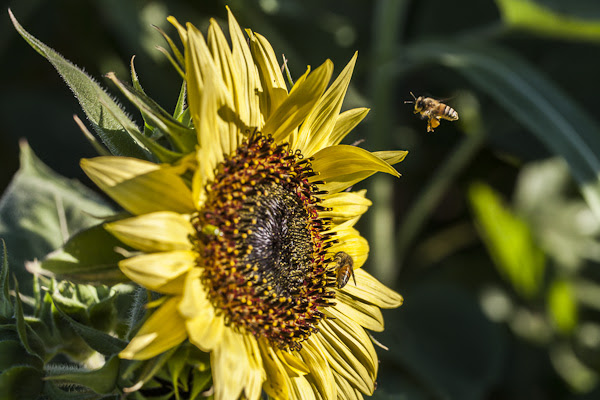
Truly, everyday is Earth Day at the farm. Our entire business was built to serve the earth - to produce nutrient-dense vegetables using organic, sustainable, and regenerative growing practices as much as possible. We produce vegetables this way not only because it's what we think consumers want, but also because it just makes sense. Our farm is 184 acres, and if we don't take care of our soil and water, we can't grow vegetables. We are proud to take good care of this little parcel of earth so that you and your family can eat food grown right here in your "neighborhood" (or county, or state). Happy earth day, everyone! Here are a few ways you can celebrate.
1. Join a CSA.
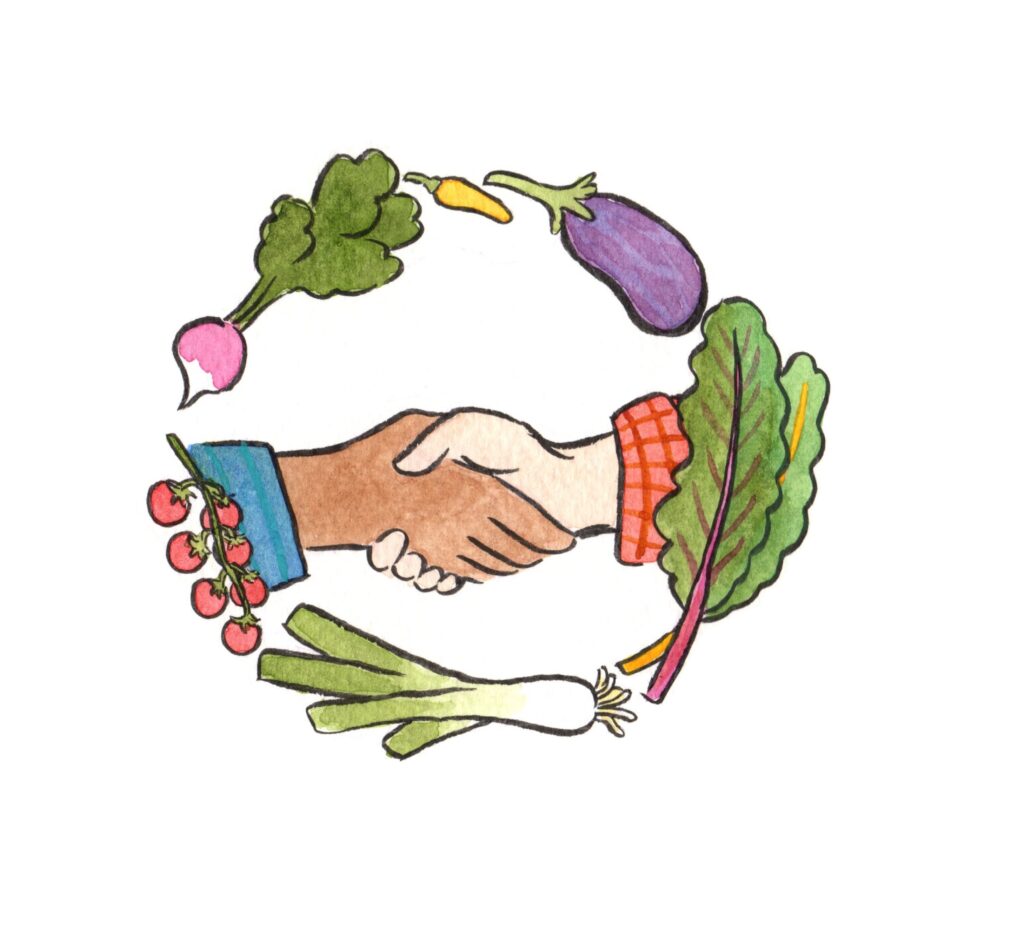 Sure, our CSA is a good option, but really, joining any CSA or local meat share is a wonderful vote for mother earth. When you purchase food that was produced within your region, you’re buying food with a lower carbon footprint. This food didn’t have to travel thousands of miles to get to your kitchen. It’s also seasonally appropriate, packed with more nutrition, and better tasting. A win for mother earth, a win for you.
Sure, our CSA is a good option, but really, joining any CSA or local meat share is a wonderful vote for mother earth. When you purchase food that was produced within your region, you’re buying food with a lower carbon footprint. This food didn’t have to travel thousands of miles to get to your kitchen. It’s also seasonally appropriate, packed with more nutrition, and better tasting. A win for mother earth, a win for you.
2. Cook a meal with all locally-sourced ingredients.
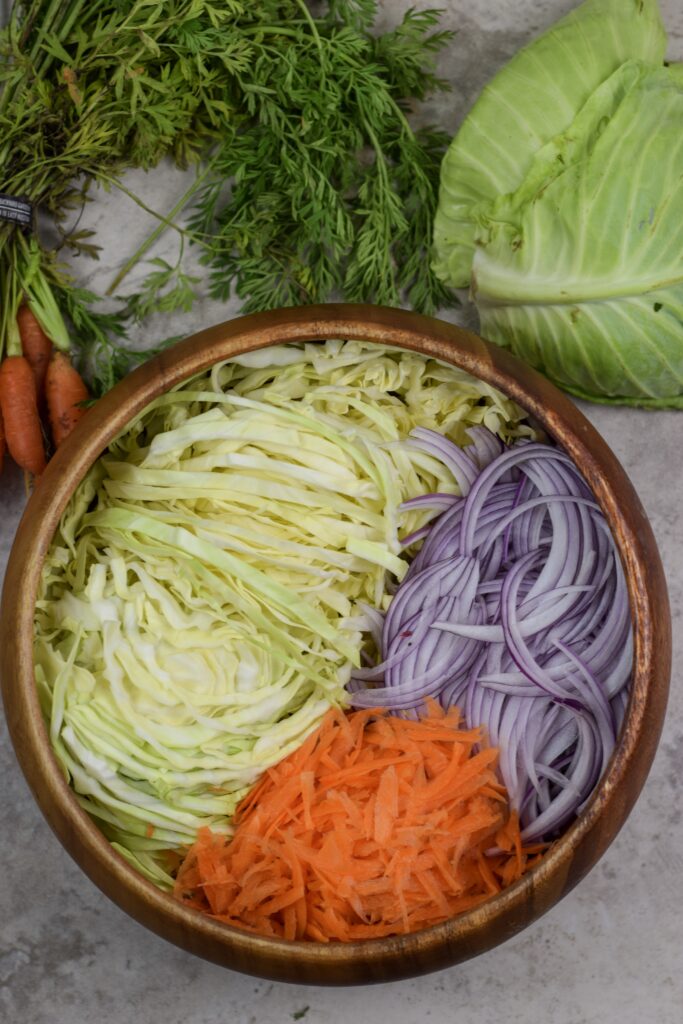
Cooking a meal with ingredients sourced from your region is not only a good move because they’re likely high-quality products, but it is also a way for you to deeply connect with your bioregion. What can the earth around you support, and when? What does a regenerative pork chop topped with a homemade chimichurri sauce taste like? (Hint - It’s going to be incredible, with minimal effort). Cooking with vibrant, fresh, and locally-sourced ingredients is a wonderful taste and thought exercise that will hopefully make you mindful about how the products you consume came to be, and the negative, neutral, or positive impact the production of this food could have on this earth - your home. Plenty of veg-forward and seasonal recipe ideas here.
3. Buy food from producers you know and trust.
Food marketing is riddled with greenwashing, but when you purchase food from a farmer or producer you actually know, you can ask questions about growing practices and working conditions. You can even visit the farm to see it all for yourself. Even certifications, like that of organic or GAP, can only go so far… but when you buy veggies from a producer you know, you can be certain they are doing good by the land they cultivate. We love our farm, and if we don’t take care of our soil and water, we won’t be able to grow vegetables on it forever, which is why we do things like cover cropping, which returns nutrients and organic material back to the soil, and provide habitat for pollinators. These are just two of the many, many ways that we manage our farmland to ensure its healthy future.4. Visit a Farmers Market.
There are so many reasons to shop at a local farmers market, but perhaps one of the most compelling reasons is that most of the market organizers have done the thoughtful and purposeful work of identifying vendors that use sustainable and regenerative farming practices. At the markets we attend, you can peruse any market stall and rest assured that you’re buying food that is not only good for you, but also good for the environment. Also: what other grocery store experience allows you to enjoy the outdoors, soak up some Vitamin D, and meet the people who actually grow your food? If you don’t normally shop at a market but would like to start, here are some tips to ensure you’ll actually want to go back.5. Think about soil, and then go play in it.
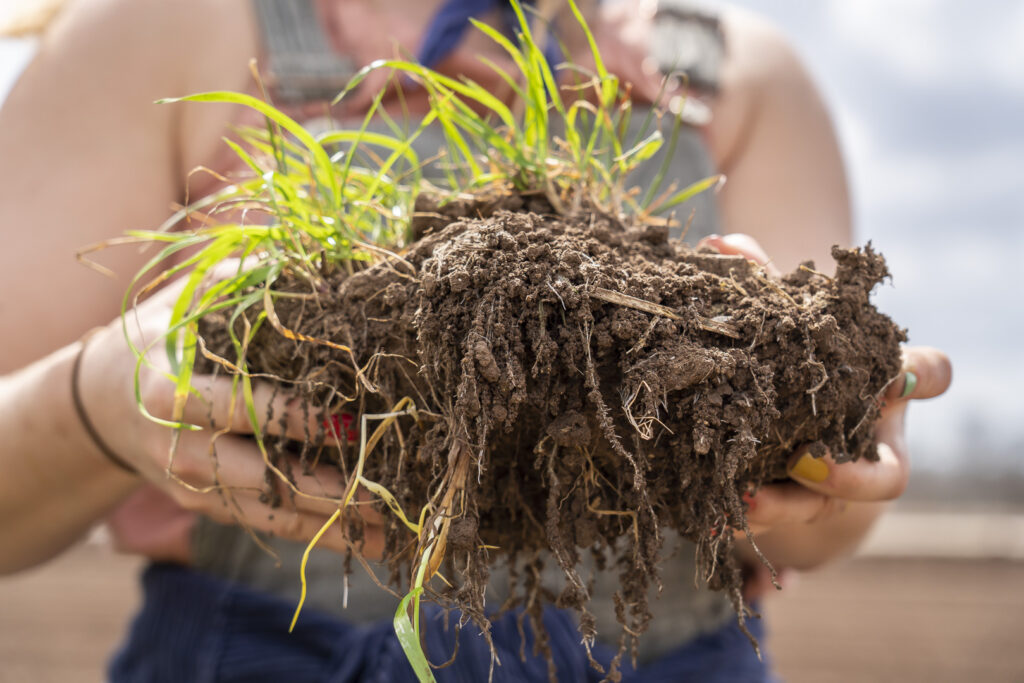
It’s hard to overstate the importance of soil health when considering the global demand for food and food production. Without healthy soils that contain a plethora of biology (think: bugs! Bacteria! Fungi!) we will be unable to grow nutritious food for our planet. Here is some reading to get you started if you haven’t considered the importance of soil before. And now that you’re thinking about soil, go play in it! There’s plenty of research out there that supports the idea that playing in the dirt releases endorphins and can actually make you happy and healthy, and as anyone with a home garden can attest - the anecdotal evidence is STRONG! Our Transplant Sale is still going strong, and we have hundreds of varieties of fruits, herbs, vegetables, and flowers like celosias, marigolds, and millet just waiting to be planted in your own backyard or patio space. We’ve got compost, too.
P.S. If Earth Day has you considering farming as a profession.... WE'RE HIRING!! It's busy time at the farm, and there are several positions that are available including a spot on our Barn Crew as well as a Farm Administrator position. You can find all the current job postings here on our website. Know someone who is looking for a job that might be a good fit for JBG? Do us a favor, and help spread the word about these great opportunities to join our farm family! Spring is here, and many hands are needed.
As always, thanks for reading! And happy Earth Day!
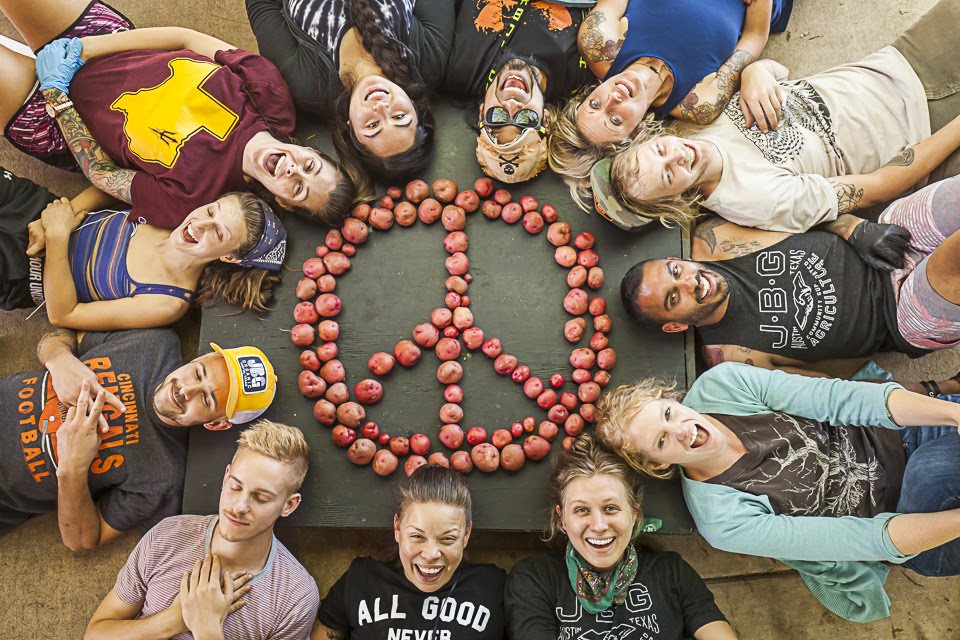 A pre-covid potato peace sign to celebrate earth day.... though you don't have to be a hippy dippy farmer to know that Earth Day is important.
A pre-covid potato peace sign to celebrate earth day.... though you don't have to be a hippy dippy farmer to know that Earth Day is important.CSA BOX CONTENTS WEEK OF APRIL 19TH
04/16/21 — Farm
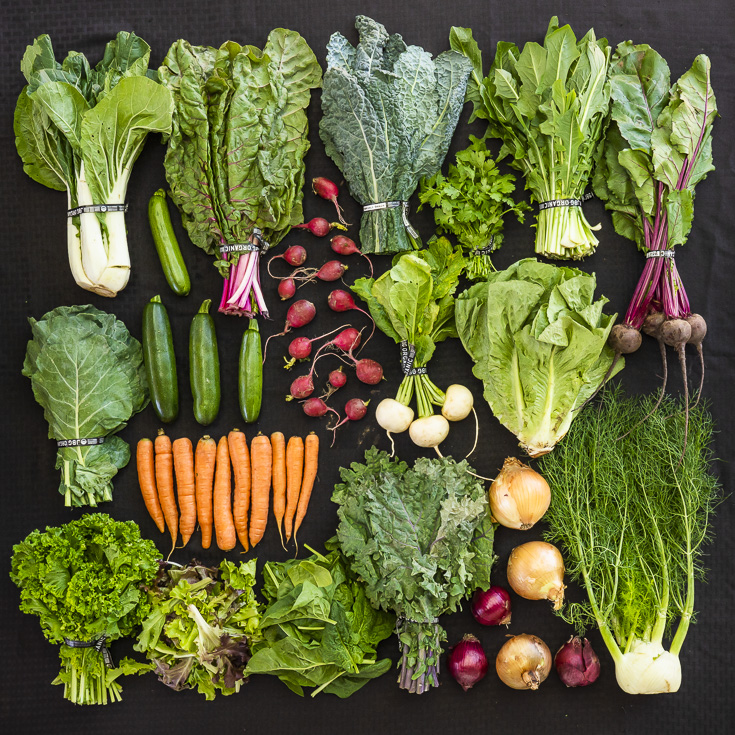 CSA Box Contents Week of Apr 19th
CSA Box Contents Week of Apr 19th
Individual: Onion, Farmer's Choice Green, Spinach, Carrot, Romaine, Farmer's Choice Herb
Small: Onion, Bagged Greens, Carrot, Red Radish, Rainbow Chard, Romaine, Farmer's Choice Herb
Medium: Onion, Spinach, Romaine, Carrot, Farmer's Choice Kale, Mustard Greens, Beet, Turnip, Farmer's Choice Herb, Romaine, Radish
Large: Onion, Spinach, Romaine, Carrot, Red Radish, Farmer's Choice, Beet, Farmer's Choice Kale, Mustard Greens, Farmers' Choice Herb
BEET POWDER
04/15/21 — Ada Broussard
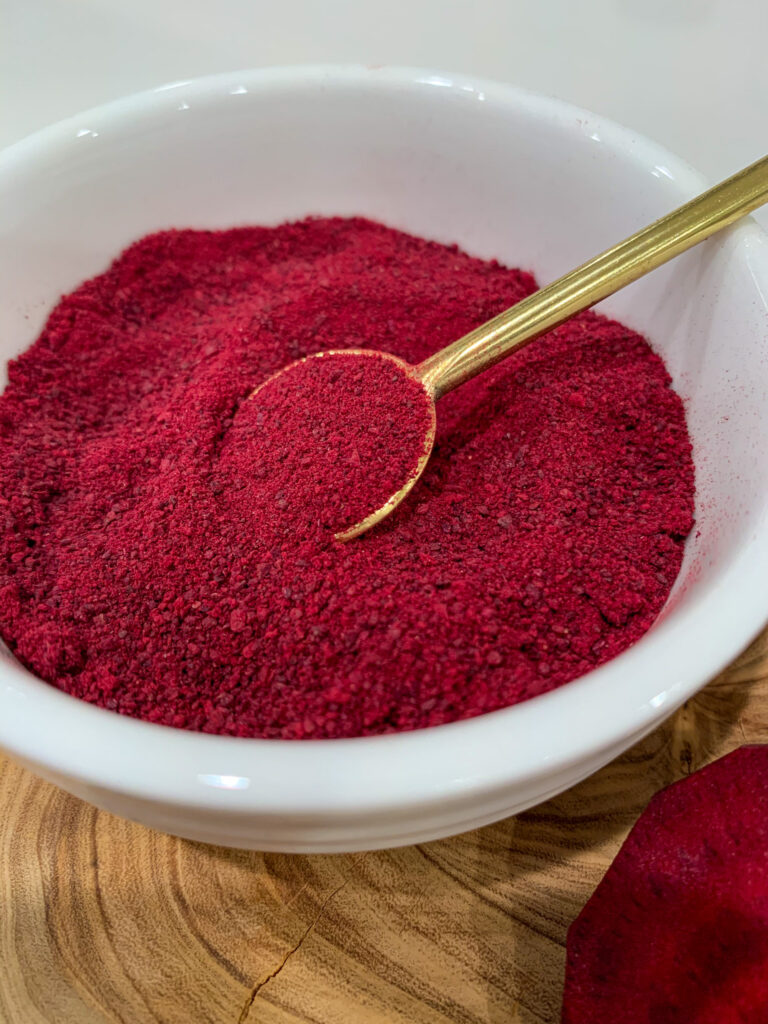 Author: The Migoni Kitchen
Author: The Migoni Kitchen
I don’t know about y’all but we have been getting so many beets in our boxes that we are starting to run out of ideas on how to use them! We were trying to come up with a way to preserve the beets other than pickling, and this is how we came up with the idea of dehydrating the beets. After dehydrating, we pulsed in our food processor until reduced to a powder. Three medium beets gave us about a ¼ cup of beet powder, so this is a great way to use up a lot of beets! So what to do with the powder?
- Add to smoothies
- Use in replacement of red food dye (great for red velvet cake!)
- Here is an example recipe of red velvet cake using beet powder:
- Use to dye clothing
- Can mix in with vaseline/chapsticks to create a tinted lip balm
- Can add to baby purees

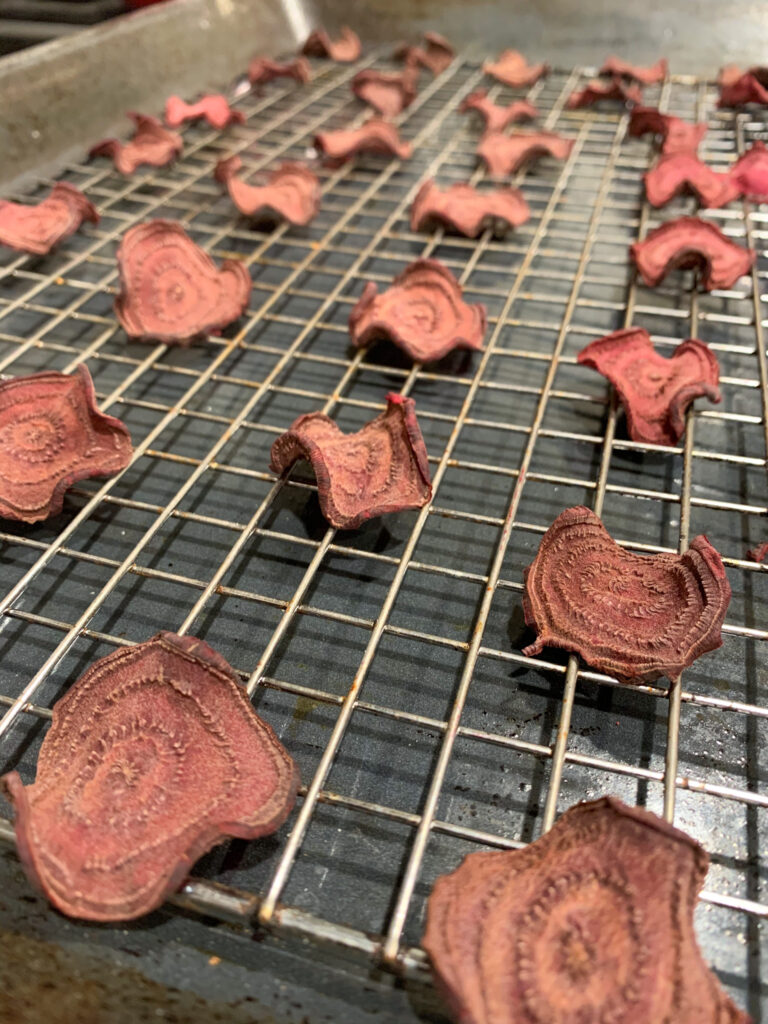
Ingredients: 3 medium beets
Instructions:
1. Wash, peel, then slice the beets as thinly as possible (use a mandolin if you have one)
2. Preheat oven to 150 degrees (or lowest possible temperature)
3. Space the sliced beets evenly on a wire rack over a cookie sheet and place them in the oven.
4. Leave the beets in the oven for 8-12 hours (overnight) or until the slices are fully dehydrated. Time may vary depending on how thick the slices are. Let cool completely.
5. Pulse in a food processor until beets form a powder. Store in a dry, airtight container for up to 3 months.






 0 ITEMS IN CART
0 ITEMS IN CART 

